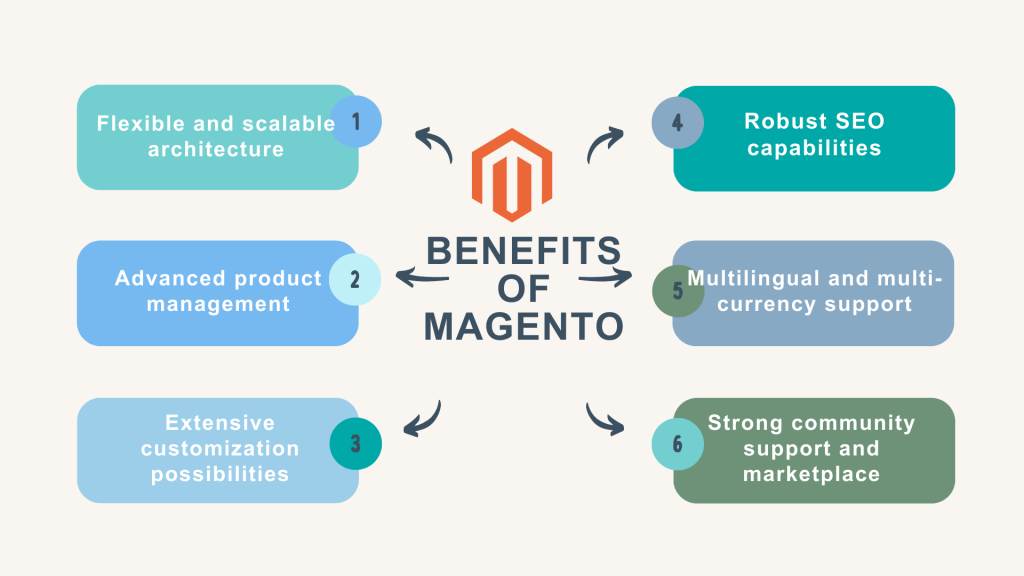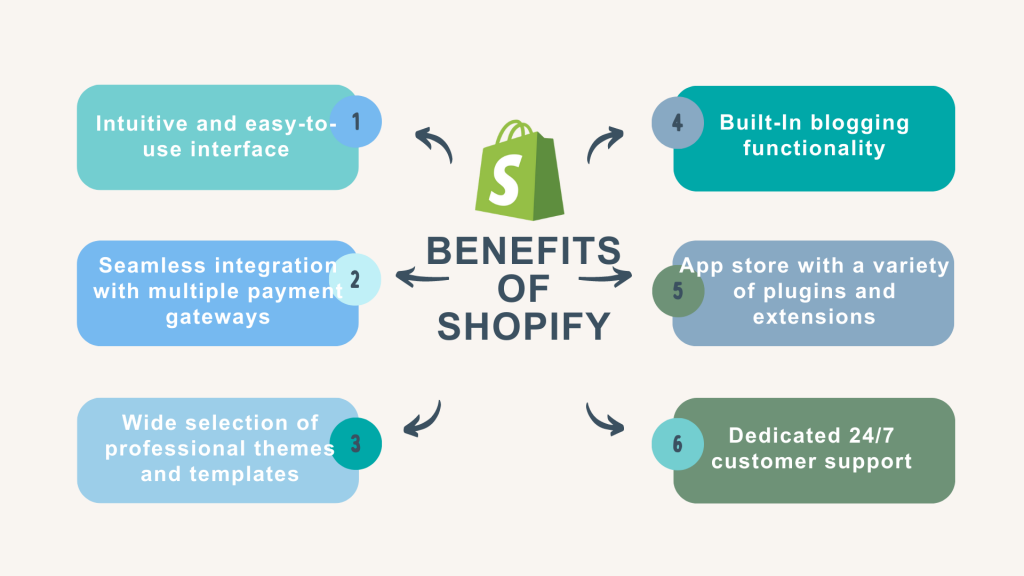In the world of e-commerce, choosing the right platform for your business is crucial. It determines your ability to manage your e-commerce business successfully, ensuring With countless options available, it’s essential to select a platform that aligns with your specific needs and goals. Two popular solutions that have gained significant traction in the market are Magento and Shopify.
In this article, we will explore the features, differences, challenges, and factors to consider when choosing between Magento and Shopify, empowering you to make an informed decision.
What is Magento?
Magento is a leading e-commerce platform that provides businesses with a robust and versatile solution for their online operations. With two main versions available, Magento Open Source and Adobe Commerce, businesses have the flexibility to choose the one that best suits their needs.
Magento Open Source
Magento Open Source, previously known as Magento Community Edition, is a free and open-source platform that empowers businesses with extensive customization capabilities. This version allows businesses to have full control over their online store’s design and functionality, enabling them to create unique and tailored experiences for their customers. With Magento Open Source, businesses can leverage a wide range of customization options, including the ability to customize themes, templates, and extensions to align with their brand identity.
Adobe Commerce
For those seeking an advanced and feature-rich solution, Adobe Commerce is the ideal choice. As an enhanced version of Magento, Adobe Commerce provides additional functionalities, enhanced security measures, and dedicated support. With this version, businesses can take advantage of a comprehensive suite of features designed to streamline their e-commerce operations and enhance the overall customer experience.
Magento features to benefit e-commerce businesses
The beneficial features of Magento are a testament to its popularity among e-commerce businesses:

- Flexible and scalable architecture
Magento’s architecture is designed to handle high traffic volumes and accommodate large product catalogs. This scalability ensures that businesses can grow their online presence without limitations, making Magento suitable for businesses with ambitious growth aspirations.
- Advanced product management
Magento offers advanced product management options, enabling businesses to efficiently organize and showcase their offerings. From configurable product options to inventory management and catalog management, Magento provides the tools necessary to streamline product management processes and improve overall operational efficiency.
- Extensive customization possibilities
One of Magento’s standout features is its extensive customization capabilities. With a wide range of themes and extensions available, businesses can tailor their online stores to reflect their unique brand identity. This level of customization allows businesses to create visually stunning and highly functional online stores that resonate with their target audience.
- Robust SEO capabilities
Magento prioritizes search engine optimization (SEO), offering robust features and functionalities to enhance a store’s visibility in search engine rankings. From customizable meta tags and URLs to XML sitemaps and SEO-friendly URLs, Magento equips businesses with the tools they need to improve their online visibility and attract organic traffic.
- Multilingual and multi-currency support
In today’s global marketplace, expanding internationally is a common goal for many businesses. Magento supports multilingual and multi-currency capabilities, allowing businesses to cater to a global audience. This feature enables businesses to seamlessly manage multiple languages and currencies, facilitating smooth transactions and enhancing the customer experience.
- Strong community support and marketplace
Magento benefits from a vibrant and supportive community of developers and users. The Magento community actively contributes to the platform’s growth and offers valuable resources such as forums, documentation, and extensions. Additionally, the Magento Marketplace provides a vast selection of extensions, themes, and integrations, allowing businesses to extend the functionality of their Magento stores with ease.
These features make Magento a preferred choice for businesses looking for a robust, customizable, and scalable e-commerce solution. Whether businesses opt for the free Magento Open Source version or the advanced features of Adobe Commerce, Magento provides the tools and flexibility necessary to create a successful online store.
What is Shopify?
Shopify is a popular all-in-one e-commerce platform that provides businesses with everything they need to start and operate an online store. It offers a user-friendly interface and a range of built-in features, making it an attractive option for businesses without extensive technical expertise.
Distinctive features of Shopify

- Intuitive and easy-to-use interface
Shopify stands out with its user-friendly approach and simplicity. The platform offers an intuitive and easy-to-use interface, allowing users to quickly set up and manage their online stores. With a straightforward setup process and a user-friendly dashboard, businesses can easily navigate and handle various aspects of their store management, including product listings, inventory management, order fulfillment, and customer data.
- Seamless integration with multiple payment gateways
One of Shopify’s key strengths is its seamless integration with multiple payment gateways. It provides businesses with a wide selection of payment options, making it convenient for customers to make purchases. Whether it’s popular payment gateways like PayPal, Stripe, or Shopify Payments, customers can choose their preferred payment method, resulting in a smooth and hassle-free checkout experience.
- Wide selection of professional themes and templates
Shopify offers a diverse collection of professional themes and templates, enabling businesses to create visually appealing online stores without extensive design skills. These themes are designed to be mobile-responsive, ensuring that the store’s appearance remains consistent and optimized across various devices. Businesses can customize these themes to align with their brand identity, creating a visually cohesive and engaging online presence.
- Built-In blogging functionality
In addition to its core e-commerce functionalities, Shopify provides built-in blogging functionality. This feature empowers businesses to create and publish valuable content directly on their Shopify stores. By leveraging the blogging capabilities, businesses can engage with their audience, establish thought leadership, and drive organic traffic to their online stores. This integration of blogging within the platform eliminates the need for third-party blogging platforms, streamlining content creation and management.
- App store with a variety of plugins and extensions
Shopify’s App Store is a notable feature that expands the platform’s capabilities. It offers a wide range of plugins and extensions that businesses can leverage to enhance their store’s functionality and customize their online presence. These apps cover various aspects, including social media integrations, email marketing tools, customer reviews, advanced analytics, and much more. The availability of a vast library of apps provides businesses with the flexibility to extend and optimize their Shopify stores according to their specific needs and preferences.
- Dedicated 24/7 customer support
To ensure a seamless user experience, Shopify provides dedicated 24/7 customer support. Businesses can rely on Shopify’s customer support team for assistance with technical issues, store management queries, and guidance on using specific features. The availability of round-the-clock support ensures that businesses can promptly address any concerns or challenges they may encounter during the operation of their online stores.
As you can see, Shopify’s user-friendly interface, seamless payment integration, wide selection of professional themes, built-in blogging functionality, extensive App Store, and dedicated customer support make it a comprehensive and accessible e-commerce platform for businesses of all sizes. By leveraging Shopify’s built-in features and integrations, businesses can establish and grow successful online stores without the need for extensive technical expertise.
Related: If you think about starting an e-commerce business on Shopify, you might want to read our article on How to start a Shopify store and run it successfully.
Magento vs Shopify: exploring key differences
Since both Magento and Shopify seem to be great solutions to run an online store, in terms of the features they provide, we’ll take a deeper look at some other aspects that can contribute to the efficiency of managing your e-commerce business.
Magento setup vs. Shopify setup
Setting up a Magento store requires a deeper understanding of technical aspects and development knowledge. This platform provides extensive customization options, allowing businesses to tailor their online stores to address their particular needs. With Magento, you can design and implement unique features, layouts, and functionalities, making it a preferred choice for businesses with complex requirements or a desire for a highly personalized online presence.
However, it’s important to note that this increased flexibility in Magento’s setup comes with some trade-offs. The implementation process for a Magento store may take longer due to the need for more technical expertise and development work.
Shopify offers a more streamlined and user-friendly setup process. It caters to businesses that prioritize simplicity and ease of use, providing a range of pre-designed templates and a user-friendly interface. With Shopify, you can quickly set up a professional-looking online store without the need for extensive technical knowledge or development skills.
Long story short, while Magento is more flexible than Shopify, offering unparalleled customization options, it requires a greater level of technical expertise, a lengthier implementation period, and potentially higher costs for hosting and development. On the other hand, Shopify offers an easier and more accessible setup process, making it a popular choice for businesses seeking a hassle-free solution.
Magento customization vs. Shopify customization
Magento is a flexible and scalable platform that allows businesses to customize their online stores according to their unique requirements. Businesses can leverage the highly customizable features of Magento to create visually stunning storefronts that reflect their brand identity. One of the significant advantages of Magento is the ability to modify the platform’s core functionality, giving businesses complete control over the shopping experience they want to offer their customers.
On the opposite side., Shopify focuses on simplicity and ease of use, offering pre-designed templates and a visual editor that allows one to easily create an attractive online store without requiring extensive technical knowledge or design skills. Shopify’s templates are fully customizable, allowing businesses to align their store’s design with their brand identity. The visual editor provides a user-friendly interface that simplifies the customization process further.
As you can see, while Magento offers more advanced customization options, Shopify’s focus on user-friendliness makes it an excellent choice for small to medium-sized businesses or entrepreneurs who prioritize a hassle-free setup and maintenance experience.
Payment options: Magento vs. Shopify
Magento and Shopify offer robust support for a wide range of online payment gateways, ensuring businesses have flexible options to accept payments from customers across multiple channels.
Magento boasts a comprehensive selection of payment methods, including popular choices such as PayPal, credit cards, bank transfers, and even offline payment options like cash on delivery. With Magento, businesses can easily integrate these payment methods into their online stores, providing customers with a convenient and secure checkout experience.
Similarly, Shopify empowers businesses with diverse payment methods to cater to various customers’ preferences. Shopify integrates seamlessly with renowned payment gateways like Stripe, PayPal, and more. This integration saves businesses the time and effort of manually setting up these payment providers and ensures smooth and reliable customer transactions. Whether customers want to pay with credit cards, digital wallets, or other alternative payment methods, Shopify equips businesses with the necessary tools to meet those needs.
In addition to online payment methods, it is worth noting that both Magento and Shopify recognize the importance of in-person transactions.
While Magento primarily focuses on e-commerce, it also offers integrations with popular point-of-sale (POS) systems, enabling businesses to accept payments in physical retail locations. This flexibility allows merchants to seamlessly combine their online and offline sales operations, offering customers a consistent experience regardless of the purchasing channel.
Shopify provides a first-party POS system, a comprehensive solution that empowers businesses to sell their products online and in physical retail locations relying on Shopify’s built-in solution to process in-person transactions. This integration between online and offline sales enables retailers to expand their reach, cater to a broader customer base, and ensure a unified experience for customers and merchants, simplifying inventory management, order fulfillment, and payment processing.
Integration with accounting: Shopify vs. Magento
Shopify excels in its ability to seamlessly integrate with a wide range of popular accounting software solutions, streamlining the process of synchronizing sales and financial data. This integration feature simplifies the management of your business’s financial transactions, allowing you to maintain accurate and up-to-date records effortlessly.
One of the advantages of Shopify’s integration capabilities is its user-friendly interface, which enables you to connect your store directly to leading accounting software without any extensive technical knowledge or coding expertise. With just a few simple clicks, you can establish a reliable connection between your Shopify store and your preferred accounting software.
By syncing sales and financial data in real-time, Shopify ensures that your accounting records are always accurate and reflect the most recent transactions. This automation saves you valuable time and minimizes the risk of human error, as manual data entry becomes a thing of the past. With a few effortless steps, you can effortlessly generate comprehensive financial reports, gain insights into your business’s performance, and make informed decisions based on reliable data.
While Magento also supports integrations with accounting software, it often requires additional customization and development work to achieve the desired level of synchronization. This can be a time-consuming and potentially costly process, especially for businesses without dedicated technical resources. In contrast, Shopify’s integration process is designed to be accessible and straightforward, ensuring that even small or mid-sized businesses can effortlessly connect their online store with their accounting software of choice.
Furthermore, Shopify’s extensive ecosystem of third-party apps and plugins provides additional flexibility and functionality when it comes to accounting integration. Whether you need advanced reporting capabilities, specialized financial analysis tools, or specific tax compliance features, there are numerous options available within the Shopify App Store to enhance your accounting workflows.
Important note: With Synder, you can easily integrate both Shopify and Magento with accounting, creating a single working space featuring automated bookkeeping, easy reconciliation, accurate reporting, and providing a comprehensive overview of the business performance, including sales, customers, and products.
Feel free to book office hours for more details or sign up for a free trial to explore Synder and its capabilities.
Marketing tools
Magento offers businesses a comprehensive set of SEO tools and features. These tools allow them to optimize their website’s meta tags, URLs, headings, and other essential elements that contribute to search engine rankings. By leveraging Magento’s SEO capabilities, businesses can improve their chances of appearing higher in search engine results, attracting more potential customers.
Additionally, Magento offers personalized promotions, a feature that allows businesses to tailor their marketing efforts to individual customer preferences based on customer data and behavioral insights. Businesses can create targeted promotions, discounts, and personalized recommendations to enhance the customer experience and increase the likelihood of conversions and repeat purchases.
Besides, Magento’s targeted email marketing capabilities provide a powerful tool for reaching customers directly and nurturing relationships. Businesses can create and automate email campaigns, segment their audience based on various criteria, and send personalized emails tailored to specific customer segments. This level of targeted communication allows businesses to deliver relevant content, offers, and updates to their customers, maximizing the effectiveness of their email marketing efforts.
On the other hand, Shopify also offers built-in SEO features that help businesses optimize their online stores for search engines. While not as extensive as Magento’s SEO capabilities, Shopify provides essential tools for optimizing meta tags, URLs, and headings. These features enable businesses to improve their search engine rankings and drive organic traffic to their websites.
However, when it comes to marketing tools beyond SEO, Shopify’s offerings are relatively less advanced compared to Magento. While Shopify does provide some basic marketing features such as discount codes, abandoned cart recovery, and social media integrations, it may not offer the same level of sophistication and customization as Magento’s marketing toolkit.
Magento hosting vs. Shopify hosting
Magento, as a self-hosted platform, places the responsibility on businesses to find and manage their own hosting solution. This grants businesses complete control over their server environment, enabling them to tailor the hosting setup to their specific needs.
With Magento, businesses have the freedom to choose their preferred hosting provider, select the hardware and software configurations, and optimize their server environment for performance and security. This level of control is beneficial for businesses that have specific hosting requirements, such as larger enterprises with complex infrastructures or unique compliance needs. By independently managing their hosting, businesses using Magento have the flexibility to scale their server resources and implement customizations as their online operations evolve.
On the other hand, Shopify takes a different approach by offering fully managed hosting for its users. When businesses opt for Shopify, they are relieved of the burden of arranging and maintaining independent hosting arrangements. Shopify handles the hosting aspect, ensuring that the infrastructure is reliable, secure, and scalable. This approach is particularly attractive for businesses that prefer a hassle-free solution, as they can focus solely on building and managing their online store without having to worry about server maintenance and optimization.
By centralizing hosting responsibilities, Shopify simplifies the setup process and streamlines ongoing maintenance. Users can rely on Shopify’s infrastructure to handle traffic spikes, provide reliable uptime, and manage security measures, such as updates and backups. This can be advantageous for small to medium-sized businesses or entrepreneurs who prioritize ease of use and a seamless user experience.
Magento support vs. Shopify support
Magento understands the value of a vibrant community and emphasizes community-driven support as one of its key strengths. By fostering forums and user communities, Magento creates a space where users can connect, exchange ideas, and seek assistance from fellow merchants. This approach encourages collaboration, knowledge sharing, and problem-solving within the Magento ecosystem. Furthermore, the collective expertise of the community helps users tackle challenges, discover innovative solutions, and stay updated with the latest trends in e-commerce.
On the other hand, for businesses that have adopted Adobe Commerce, a powerful and feature-rich e-commerce solution built on the Magento platform, there is an added advantage of dedicated support through Adobe’s customer service. Adobe Commerce users can benefit from personalized assistance, tailored recommendations, and expert guidance provided by Adobe’s customer service representatives. This direct support channel ensures that businesses utilizing Adobe Commerce receive prompt and reliable solutions to their queries, technical issues, and any other concerns they may encounter.
In contrast to Magento and Adobe Commerce, Shopify takes a slightly different approach to customer support, emphasizing round-the-clock assistance for its users. Shopify offers 24/7 customer support through various channels, including live chat, phone, and email. This commitment to constant availability ensures that merchants using Shopify can reach out for help at any time, regardless of their geographical location or time zone. Whether it’s a pressing matter that needs immediate attention or a general inquiry, Shopify’s customer support team is dedicated to providing timely and effective resolutions.
Related: You might also want to read the comparison of Magento and WooCommerce.
Major Challenges of Magento and Shopify you might want to consider
With all the wonderful features under the hood, both Magento and Shopify come with some drawbacks you might want to consider before you decide to go with one of the platforms. Learning about potential challenges is not about scaring someone away from using a product. It’s rather about acknowledging what may go wrong and understanding whether you’ll be able to provide for it (for example, do you have the necessary knowledge, skills, or resources to take care of the issues).
Magento challenges
Magento, while offering robust features and customization capabilities, presents some challenges that businesses should be aware of:
Technical сomplexity
One of the main challenges with Magento is its technical complexity. Compared to other e-commerce platforms, Magento requires a higher level of development expertise to set up and maintain. The platform’s extensive customization options and flexibility come at the cost of a steeper learning curve for developers. Businesses may need to invest in hiring skilled Magento developers or working with experienced development agencies to effectively utilize the platform’s capabilities.
Potentially higher upfront costs
Magento’s flexibility and scalability often come with higher upfront costs. Businesses may need to invest in hosting, development, and maintenance to ensure optimal performance. While Magento Open Source is free to use, businesses should consider additional expenses such as server resources, premium themes, extensions, and ongoing development and maintenance costs. For small businesses with limited budgets, these upfront costs can be a significant factor to consider when choosing a platform.
Scalability issues without proper optimization
Magento’s scalability can be challenging without proper optimization and allocation of server resources. As the business and traffic grow, it’s essential to ensure that the Magento store is optimized for performance. Without proper configuration and optimization, businesses may experience slower loading times and potential server resource limitations. To overcome this challenge, businesses need to work closely with experienced developers and hosting providers to ensure their Magento store can handle increased traffic and demands.
Maintenance and updates
Regular maintenance and updates are crucial for keeping a Magento store secure and up to date. However, managing updates can be a challenge for businesses, particularly if they have extensive customizations or rely on third-party extensions. Upgrading to newer versions of Magento may require additional development work to ensure compatibility with existing customizations and extensions. It’s important for businesses to consider the ongoing maintenance requirements and associated costs when choosing Magento as their e-commerce platform.
Shopify challenges
Now, let’s get to the challenges a business might face using Shopify to run their online store. So, if you plan to go with Shopify, you might want to consider those.
Limited customization options
One challenge with Shopify is the limited customization options when compared to Magento. While Shopify provides a range of professional themes and templates to choose from, businesses may face constraints when it comes to achieving highly unique and tailored designs. Customizing the appearance and functionality of the store beyond the capabilities offered by the available themes may require more advanced technical skills or hiring a Shopify expert. However, it’s worth noting that Shopify’s theme customization options have improved over time, offering more flexibility to businesses.
Transaction fees for external payment gateways
Shopify provides its own payment gateway called Shopify Payments, which allows businesses to accept payments without transaction fees. However, if businesses choose to use external payment gateways, such as PayPal or Stripe, additional transaction fees are incurred. This can add to the overall cost of running the store, particularly for businesses with high sales volumes. It’s essential for businesses to carefully consider the transaction fees associated with their preferred payment gateway and evaluate its impact on their profitability.
Limited control over hosting and server environment
With Shopify, businesses have limited control over the hosting and server environment. Shopify manages the hosting infrastructure, ensuring reliable performance and security. While this can be advantageous for businesses without technical expertise, it also means that businesses have less control over server configurations and optimization. This lack of control may limit the ability to fine-tune the server environment to meet specific requirements or address unique performance needs. However, it’s important to note that Shopify’s infrastructure is built to handle high traffic and provide a stable and secure hosting environment for most businesses.
Overcoming potential challenges you might face using Magento and Shopify
As previously mentioned, knowing the challenges you might face can help you provide for them in the future. Businesses might apply several strategies to navigate the challenges associated with using Magento or Shopify more effectively. Seeking professional assistance, careful planning and budgeting, leveraging available resources and user communities, and continually learning and staying updated are key to ensuring a successful and rewarding experience with these e-commerce platforms.
Let’s break it down.
Seek professional assistance
One effective way to overcome the challenges associated with using Magento or Shopify is by seeking professional assistance or hiring experienced developers. These experts have in-depth knowledge of the platforms and can help businesses navigate technical complexities, customize the stores, and optimize performance. Their expertise ensures that businesses make the most of the platform’s capabilities and overcome any hurdles they may face.
Plan and budget carefully
Another crucial aspect of overcoming challenges is careful planning and budgeting. Businesses should allocate sufficient resources for the initial setup, including hosting, development, and maintenance costs. By accurately estimating these expenses upfront, businesses can ensure a smooth transition onto the chosen platform without encountering financial setbacks. Additionally, ongoing maintenance costs should be considered to keep the store secure, up-to-date, and optimized for performance.
Explore available resources
Both Magento and Shopify provide extensive resources for users to find solutions to specific challenges. Users can turn to official documentation, forums, knowledge bases, and user communities to seek guidance and assistance. These resources often contain valuable insights, troubleshooting tips, and best practices shared by experienced users and developers. By exploring and leveraging these resources, businesses can find answers to their questions and overcome common challenges they might encounter.
Leverage user communities
Engaging with user communities can be highly beneficial in overcoming challenges. Online forums, social media groups, and community platforms dedicated to Magento or Shopify provide spaces for users to connect, share experiences, and seek help. Participating in discussions, asking questions, and sharing insights can foster a supportive environment where businesses can learn from others’ experiences and find practical solutions to their challenges.
Learn and stay updated
E-commerce platforms like Magento and Shopify continuously evolve and introduce new features, updates, and best practices. To overcome challenges effectively, it is essential for businesses to invest in continual learning and staying updated with the latest developments. This includes keeping track of platform updates, attending webinars, following industry blogs, and participating in training programs or workshops. By staying informed, businesses can proactively address challenges and leverage new opportunities offered by the platforms.
Magento vs Shopify: Choosing the right e-commerce platform for your business
Selecting the right e-commerce platform is vital as it directly impacts your business’s success. At this point, you might want to choose an e-commerce platform that aligns with your business goals and meets your specific requirements. The wrong choice can have detrimental effects, such as lost sales, customer dissatisfaction, and limited growth opportunities. On the other hand, selecting the right platform can empower your business to thrive in the competitive online marketplace and capitalize on the vast potential of e-commerce.
When embarking on the process of selecting an e-commerce platform, several factors should be taken into consideration. These factors will help you make an informed decision that suits your business needs and sets the stage for long-term success.
Let’s break them down.
Business size and scalability requirements
First, you might want to consider your business size and scalability requirements. The chosen platform should be able to accommodate the current size of your business and have the capacity to handle future growth. It should offer scalable features and resources that can adapt as your customer base expands and your sales volume increases.
Technical expertise and resources available within your organization
Next, evaluate the technical expertise and resources available within your organization. Some e-commerce platforms require higher technical proficiency to set up and maintain. Assess whether your team has the necessary skills and knowledge to manage the platform effectively or if you might need additional training or external support.
Customization needs and control over the website
Customization needs are another critical aspect to consider. Depending on your business model and branding requirements, you may need a higher level of control over the website’s design and functionality. Ensure that the chosen platform offers customization options that align with your vision and allows you to create a unique and tailored online shopping experience for your customers.
Budget constraints and cost considerations
Budget constraints and cost considerations play a significant role in the decision-making process. Different e-commerce platforms have varying pricing models, including upfront costs, transaction fees, and additional charges for specific features. You might want to analyze your budget and evaluate the platform’s pricing structure to ensure it aligns with your financial resources and expectations.
Integration capabilities
Integration capabilities are also vital, especially if you rely on third-party systems and services for various business operations. Consider the integrations required with payment gateways, shipping providers, inventory management systems, and other essential tools. The e-commerce platform should seamlessly integrate with these systems to streamline your operations and provide a seamless experience for both you and your customers.
Long-term growth strategy and expansion plans
Ultimately, you might want to consider your long-term growth strategy and expansion plans. As your business evolves, you may want to expand into new markets, offer additional product lines, or integrate advanced marketing and sales strategies. The chosen e-commerce platform should have the flexibility and scalability to support your future growth objectives, allowing you to adapt and incorporate new features and functionalities.
As you can see, multiple factors can contribute to your final Shopify vs Magento decision. Still, investing time and effort into selecting the right platform will pay off, saving you from potential setbacks and unlocking significant growth opportunities in the future.
Conclusion
In the ever-evolving world of e-commerce, choosing the right platform is crucial for the success of your business. Magento and Shopify are both powerful solutions, each with its own unique strengths and challenges. By carefully considering the features, differences, and challenges associated with Magento and Shopify, as well as evaluating your business’s specific needs, you can make an informed decision that sets your e-commerce venture on the path to success. Remember, choosing the right e-commerce platform is an investment in the growth and future of your business.






